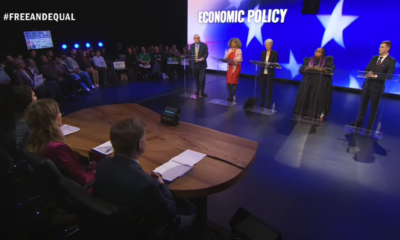Opinion
Op-Ed: America’s Support of Israel is Detrimental to Foreign Policy

“Israel’s security can rest on the United States, but right now it has more than the United States. It has the European Union, it has Europe, it has most of the world… But [Israel is] starting to lose that support by the indiscriminate bombing that takes place.”
The above statement is from a campaign reception address delivered by President Joe Biden, issued on December 12, 2023. The speech marked one of the first incidents in which the United States threatened to withdraw its steadfast support from Israel. A similar censure of Israeli militant operations was released by Biden on April 2 of this year, following an IDF-coordinated airstrike that killed seven World Central Kitchen humanitarian aid workers:
“…Israel has not done enough to protect aid workers trying to deliver desperately needed help to civilians. Incidents like yesterday’s simply should not have happened. Israel has also not done enough to protect civilians. The United States has repeatedly urged Israel to deconflict their military operations against Hamas with humanitarian operations, in order to avoid civilian casualties.”
In spite of the numerous instances in which Biden has pressured Israeli Prime Minister Benjamin Netanyahu to de-escalate the current situation in Gaza, the U.S. continues to pledge staunch support to Israel, specifically to Israel’s military. In fact, U.S. contributions make up more than 15 percent of IDF funding. Overall, the United States has given roughly $300 billion to Israel, in addition to supplementary aid packages and arms transfers.

Given the fact that the U.S. continues to fund Israel in spite of the numerous humanitarian violations that have taken place in Gaza, it is needless to say that the bond between the U.S. and Israel is unshakably strong. Why, though? What does the United States receive in return for its steadfast support, if anything at all? Does America’s support of Israel strengthen or weaken U.S. foreign policy?
It is not entirely plausible to explain America’s allegiance to Israel as support for the Jewish people. If the United States cared about the Jewish people, there would be none of the rampant anti-Semitic attacks that have increased since October. If the United States cared about the Jewish people, there would be no perceived need for a Jewish nation-state anyway.
The real reason for U.S. backing of Israel lies in America’s own imperialistic ambitions. To the United States, Israel is something of an unofficial yet highly funded military branch, an armed stronghold that asserts itself as a sovereign state.
Geographically speaking, Israel is of strategic importance to the U.S. because of the nation-state’s close proximity to Afro-Eurasia. Since its inception in 1948, Israel has been a reminder of “stability” (that is, Western militant power) in an unstable region, a second America amidst America’s global enemies. During the Cold War, for example, the United States used Israel to deter Soviet influence in the Middle East. Later, Israel served as a vassal of the U.S. military, hampering the progress of Iranian missile development and contributing to America’s post-9/11 efforts to combat terrorism.
According to analyst Fayez Hammad, Biden’s stance on Israel is a veritable political heirloom from the Nixon administration, a perpetuation of the Cold War notion that America requires “strong regional allies” to preserve security. However, America’s historical favoritism towards Israel is no longer viable in terms of foreign policy.
There is the possibility that supporting Israel weakens the position of the United States on the global stage. After all, the Palestinian people have suffered more than 35,000 civilian casualties since Hamas’s attack in October. The question is inevitably raised: how can a government emphasize democracy on its own land, but endorse an apartheid regime on another?
By supporting Israel, the United States ultimately loses more than it gains. America’s current relationship with Israel places the U.S. at risk: already, U.S. forces have been subjected to attacks carried out by Houthi rebels and offensive units from Syria and Iraq. Efforts to diffuse tensions will likely prove inefficient, worsening the situation in the Middle East until it spirals eventually out of U.S. control.
Opinion
Op-Ed: Biden’s Sudden Change of Heart

Only two weeks after barring illegal immigrants from seeking asylum at the U.S. southern border, President Joe Biden has reversed his restrictive policies on refugees.
This rapid turnaround came in the form of protections for more than half a million undocumented children and spouses of U.S. citizens. Currently, an illegal immigrant who marries a natural citizen is required to endure a parole period before submitting an application for residency, a long process that has the potential to cost a migrant their family and career. Biden’s recent legislation permits undocumented spouses to complete the residency process without returning to their native country, an executive relief action purportedly designed to prevent the separation of families.
Why did the White House’s previously tough policy on asylum-seekers change, especially so suddenly? Though Biden claimed that he is “not interested in playing politics” regarding legislation on the border, the primary reason for the shift in administration seems to be electoral, calibrated to contest Trump’s threats to deport up to 10 million immigrants should he win a second term in office.
“When [Trump] was president,” Biden said, “he separated families and children at the border. And now he’s proposing to rip spouses and children from their families, homes, and communities, and place them in detention camps. He’s actually saying these things. It’s hard to believe it’s been said, but he’s actually saying these things out loud.”
The purpose of the legislation seems to be appeal. Non-restrictive immigration policies are designed to win Latino votes in battleground states such as Arizona and Nevada, which will be crucial to Biden’s re-election. The new policy is also a reconciliatory effort directed towards lobby groups and immigrants’ rights organizations, including the American Civil Liberties Union, which filed a suit against the Biden administration on June 12 for its handling of the border.
But does this change of heart matter at all? Is it performative, or does it seek to provide actual relief for immigrant families? Chad Wolf, secretary of the Department of Homeland Security under Donald Trump, claims the recent action is the latter, since many undocumented spouses of U.S. citizens who have been in the country for an extended period of time do not face the risk of deportation: “I’m trying to understand the problem that the Biden administration is [solving] here, and I just don’t see it.”
Since Congress repeatedly neglects to address immigration and the border crisis, Biden’s reversal of policy may also prove fleeting. Any executive action not solidified by congressional law has the potential to be contradicted by courts and the administration of the subsequent office holder. (Consider, for example, Obama’s DACA program; failing to end DACA entirely, Trump prevented the submission of new applications, a policy that Biden then upturned.)
Opinion
Op-Ed: Living With Our Food

The question “How can I live with myself?” is invariably raised when one has done something particularly cruel or worthy of self-condemnation. As human activity proves increasingly detrimental to our climate and our population, producing more natural disasters, more pollution, and more scarcity, it is difficult not to apply the question to society as a whole: How can we live with ourselves?
Industrial agriculture is not sustainable. It excessively consumes water and fossil fuels, depletes topsoil, and irreversibly damages biodiversity. It is responsible for over 30% of global greenhouse emissions, according to the U.S. Environmental Protection Agency, and has churned out roughly 671.5 million tons of carbon dioxide as of 2021.
It also increases the power corporations exert over food production, ultimately placing a greater emphasis on profits than on people. As it is, we live against our food. My proposal is that we begin to live with it, to incorporate our food supply into our surroundings through a system called permaculture.
“Permaculture,” as the name implies, is a land management and design technique that emphasizes sustainability. The primary goal of permaculture is to combine people and environment in a fashion that is mutually beneficial to all by recycling energy and guaranteeing wildlife conservation alongside sufficient production. It seeks to establish closely knit communities and ensure a stable supply of nutrients and resources. It is, in short, agriculture that lasts.
Commonly, permaculture is practiced on a small scale, in urban gardens or outside of private homes. I suggest, however, that we implement permaculture on a municipal scale, that we integrate it as a viable “green” component of our infrastructure and an ethical means of healthily maintaining our population.
How could permaculture become a central part of cities? The answer lies in community collective projects such as guerilla and rooftop gardens, recycling facilities, and street trees. The benefits of adopting these practices are as follows:
Decentralization of corporate control. When communities make individual design decisions and take production into their own hands, they are separating themselves from the corporate systems that dominate agriculture through the active degradation of our planet.
Decreased food waste. Because industrial agriculture is so cheap, and because it operates on such a mass scale, it produces more food than necessary, generating a surplus that inevitably goes to waste rather than to the people who need it the most. Permaculture eliminates this surplus while ensuring that each person has access to sufficient nutrients by making food free and local.
Decreased scarcity. Research conducted by the World Health Organization in 2022 found that 2.4 billion people experience moderate to severe food insecurity, a statistic that is vastly incongruous to agriculture’s immense food output. In a society fed by permaculture, food insecurity does not exist, because even our population’s most vulnerable members can obtain food easily.
Community gardens and fruit-bearing trees that are reasonably resistant to air pollution such as lemons, pawpaws, persimmons, and loquats could be planted along sidewalks. This system could also reduce income disparities by employing low-income and homeless populations to maintain street trees and the surrounding areas.
Reduced pressure on forests. Both agricultural areas and urban suburbs are guilty of sprawl, which threatens forests and further destabilizes the ecosystem. Permaculture encourages the restoration of wildlife by allowing nature to heal.
Decreased use of fossil fuels and chemicals. The localization of food promised by permaculture reduces the need for transportation, a major contributor to emissions. Food growth would also be transparent, permitting communities to be aware of the chemicals used to raise their food.
Faced with extreme environmental concerns, it is not sensible for society to continue attempting to support itself on an unsustainable system. A vast alteration in the way we produce and consume food is necessary to transform our environment and facilitate the close operation of human interests alongside those of nature.
Opinion
Op-ed: Ukraine has a tough choice to make. The rest of the world doesn’t.

It has been more than 2 years since Russia’s invasion of Ukraine began. A period that was torturous to the people living in Ukraine and even worse for those fighting for the nation. A period in which the people of Ukraine demonstrated resilience, patriotism and determination to the whole on a scale rarely seen before.
The very fact that the invasion, which most people expected to end in 2 days, has lasted for more than 2 years is a testament to the spirit the people of Ukraine have demonstrated. The resistance that began by successfully countering Russia’s advances soon launched an offensive that managed to surprise the whole world with its remarkable success.
A Wagner rebellion that briefly threatened to end the Putin regime gave the world some hope that maybe Ukraine could win this war. What has happened since then is not so positive for the Ukrainian people. A lack of weapons, (thanks to the gridlock in US politics) meant that the Ukraine’s defense forces are severely outgunned and outnumbered by their Russian counterparts.
Russia’s economy has outperformed expectations, and Ukraine’s soldiers are now psychologically and physically strained. The relatively small population of Ukraine means they are bound to have fewer soldiers than their invaders, and new mobilization laws have been understandably divisive and unpopular.
Although the US and Europe are continuing to provide weapons and ammunition, the political consensus has shifted and most now believe that Ukraine will not be able to win the war. Political divisions in the United States mean that it is unclear if Ukraine will continue to receive the same level of aid and support in the next few years. The Putin regime has settled in for the long fight, biding his time while he waits for Ukraine’s western allies to tire of sending money and weapons.
In such a situation, questions have been raised as to whether Ukraine’s best interest lies in continuing the resistance and fighting until the end, or with achieving peace through compromise. In my view, the answer lies not with us, the rest of the world, but with the people of Ukraine themselves.
If the Ukrainian nation wants to fight until its last breath and uphold their democratic principles, then the free world is obligated to ensure that the soldiers fighting in the trenches have the resources they need. But would this be in the best interests of the citizens of Ukraine?
The new mobilization law has been unpopular with the people, and currently serving soldiers have been devastated physically and mentally. A favorable situation looks unlikely on the ground. It is now time for them to make a difficult choice.
Do they continue their fight for their dignity and their democratic principles at the expense of the lives of their youth? Or do they opt for a peace treaty, saving countless lives, but sacrificing vast regions of their nation and submitting to tyranny.
This choice is undoubtedly hard, and it will be controversial, but I believe it is time for Ukraine to make it. No matter what the people of Ukraine choose, the responsibility of the rest of the world is crystal clear: support Ukraine till the very end.
-

 Campaign 20242 years ago
Campaign 20242 years agoNew poll reveals Hogan’s path to victory
-

 Campaign 20242 years ago
Campaign 20242 years agoRep. Mike Collins makes antisemitic post on X
-

 Campaign 20242 years ago
Campaign 20242 years agoThe Minor Candidate Debate Recap
-

 Opinion2 years ago
Opinion2 years agoOp-ed: Stop talking about Bidenomics
-

 Education2 years ago
Education2 years agoK-12 teachers report varied views on race, gender identity in new poll
-

 State Politics2 years ago
State Politics2 years agoThe new minimum wage in California
-

 Campaign 20242 years ago
Campaign 20242 years agoRFK Jr. campaign releases surprise rap song
-

 Campaign 20242 years ago
Campaign 20242 years agoRuben Gallego quietly leaves Progressive Caucus













